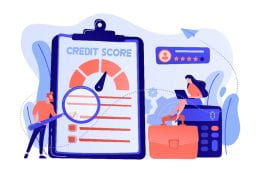
Photo Source
Credit scores are amazing tools that you can use to your advantage! Let me tell you how! Your credit score can be referred to as your “financial GPA.” It’s a record of how reliable you are at paying off your debts/lines of credit. In the same way that your school GPA is a record of how reliable you are as a student.
So why are credit scores so important? Well, let me show you two different scenarios that happen often.
Ashe and Scout:
Ashe and Scout are roommates attending K-State. They have known each other since freshman year when they shared a dorm. They both applied for a credit card together while still living in the dorms. They each get accepted for a student credit card even though neither of them had a credit score previously. Each of their credit cards has a $500 limit. Ashe wasn’t sure how to best use a credit card and decided to schedule an appointment with Powercat Financial to get some tips and information from a peer. Scout felt like credit cards were easy and not that complicated.
Ashe starts out using their card for gas and paying it off every time they use it. Scout, on the other hand, uses their card for just about everything, while paying the minimum payment almost every month. Freshman year ends, Ashe and Scout decide to get an apartment together. Both need a cosigner because they haven’t had a credit score for very long. Both are using their cards the same way they did in the dorms and their credit card limits have both increased to $1,500.
Sophomore year goes by, Ashe and Scout are still living together but decide to move to a house for more space. This time, Ashe does not need to have a cosigner for the lease, but Scout does. This is because Ashe’s credit score is higher than the minimum required credit score to sign a lease by themselves. Scout still needs to have a cosigner because their score is not higher than the minimum requirement.
Scout and Ashe have never discussed how they use their credit cards. Scout is confused that Ashe doesn’t need a cosigner now. They have a conversation and realize that they are using their cards very differently. Scout schedules an appointment with Powercat Financial to learn about healthy credit card practices and how to pay off their credit card debt. After the meeting, Scout feels more empowered and confident in themselves to use a credit card more responsibly and now has a plan to pay off the credit card debt that has accrued.
During senior year, Ashe’s car breaks down and they need to get a new one. Ashe goes around town and finds a $10,000 used vehicle that will require a loan. Ashe goes to their bank and applies for an auto loan. The bank approves Ashe’s application because their credit score is 670, the interest rate on this loan is 9.73%. Scout applies for the same loan at the same bank for their first car ever. Scout’s credit score is 490 so their interest rate is much higher, at 21.55% for the $10,000 used car they wanted.
After graduation, Ashe starts looking for a house to buy near their new job. Ashe’s credit score is now 770 because Ashe has been paying a little more than the minimum payment on their car loan every month and has continued to pay their credit card off in full every month. Because Ashe’s credit score is almost 800, they are in the “very good” credit range and get an interest rate of 5.99%. Scout would also like to purchase a house, they pay the minimum payment on their auto loan, but have been paying off their credit card in full every month since meeting with Powercat Financial. So, Scout’s credit score is now 665! This is in the “fair” range, where previously, Scout was in the “poor” range. If Scout and Ashe apply for the same loan amount in the same zip code, Scout’s interest rate for their mortgage is 6.88%.
So, what does this mean? Great question! If Scout didn’t change their habits and still had a 490 credit score (potentially lower over time), they might not have gotten approved for the mortgage at all. Even though their credit score increased, the 1.11% difference in Ashe and Scout’s interest rates is a significant amount of money. For the same $208,000 loan, Ashe would pay $240,000 in interest whereas Scout would pay $284,000 in interest. So, for that 1.11% Scout had to pay $44,000 more than Ashe.
This story is to illustrate how important credit and your credit score are. A credit score “is the power to borrow money” (Experian). It is the ability to get something now and pay for it later. Typically, things that will be hard to have all the cash needed for the purchase, like a vehicle or home. You can utilize your credit score to leverage great deals for loans, cell phone plans, apartments, credit cards, etc.
If you have any questions about how to check/improve your credit score or just to learn more information about credit in general, please schedule a meeting with one of our peer counselors or look through our website.
Kirsten Ouellette
Peer Counselor I
Powercat Financial
www.k-state.edu/powercatfinancial
